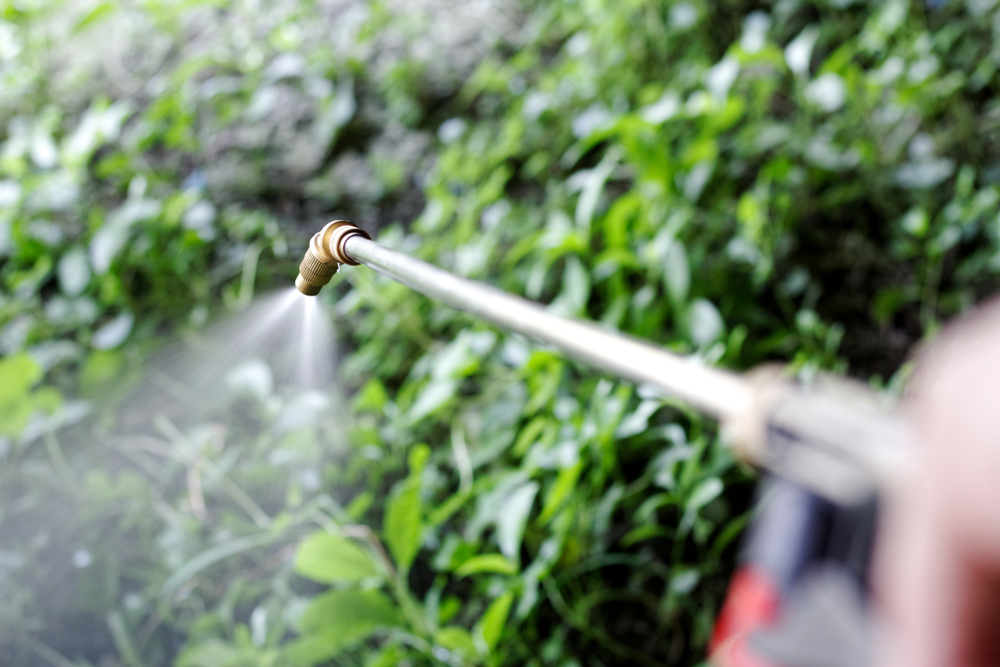Did You Develop Parkinson's Disease After Using Paraquat?
Paraquat has been named in dozens of lawsuits filed by farmers, agricultural workers, and others who were diagnosed with Parkinson’s disease and other serious medical problems after being exposed to the toxic weedkiller during mixing, loading, or application.

Start My Paraquat Claim Now
paraquat Lawsuits
Paraquat has been named in dozens of lawsuits filed by farmers, agricultural workers, and others who were diagnosed with Parkinson’s disease and other serious medical problems after being exposed to the toxic weedkiller during mixing, loading, or application.
A controversial weedkiller that has been banned in much of the world but remains in use in the United States may be to blame for hundreds, if not thousands, of former users developing Parkinson’s disease, a central nervous system disorder that causes irreversible nerve cell damage in the brain. Paraquat is known to be extremely toxic and while much of the concern surrounding the weedkiller in the past has revolved around Paraquat poisoning, a growing body of evidence suggests that exposure to Paraquat from mixing, loading, or spraying the herbicide or through herbicide drift may also increase the risk of Parkinson’s disease. If you or someone you know was diagnosed with Parkinson’s disease after using or being exposed to the weedkiller Paraquat, you will want to speak to an experienced product liability lawyer as soon as possible. Contact our consumer advocates today to find out if you are eligible to file a Paraquat injury lawsuit against Syngenta or other manufacturers.
What is Paraquat?
Paraquat is a powerful herbicide widely used in both agricultural and non-agricultural settings in the U.S. for weed and grass control. The active ingredient paraquat dichloride is sold under several different brand names, including Gramoxone, Firestorm, Helmquat, and Parazone, and can be found at farming and agricultural supply stores. Introduced in the 1960s, Paraquat has become one of the most popular commercial herbicides in the U.S., commonly used as a substitute for the glyphosate-based weed killer Roundup, which has been linked to an increased risk of non-Hodgkin’s lymphoma and other cancers in users.
Although Paraquat is approved for use as a weed and grass killer, repeated exposure to the herbicide during mixing, loading, application, or other direct or indirect contact is strongly associated with serious side effects like Parkinson’s disease. Even the CDC identifies Paraquat as a “toxic chemical” that is “highly poisonous,” and warns that the toxic effects of Paraquat can lead to long-term side effects like lung damage, heart failure, kidney failure, and esophageal strictures. Unfortunately, with Bayer and Monsanto currently embroiled in a high-profile legal battle involving thousands of lawsuits alleging that Roundup cases cancer, Paraquat usage is expected to grow in the U.S., which may put more and more Paraquat applicators and other exposed individuals at risk for Parkinson’s disease and other major health problems.
Possible Side Effects Leading to a Paraquat Lawsuit
Paraquat is extremely toxic, and it can cause fatal poisoning if even a small drop of the weedkiller is ingested. “Because paraquat is highly poisonous, the form that is marketed in the United States has a blue dye to keep it from being confused with beverages such as coffee, a sharp odor to serve as a warning, and an added agent to cause vomiting if someone drinks it,” the CDC website states on its “Facts About Paraquat” page. Due to its extreme toxicity, Paraquat has been banned in dozens of countries and its use is heavily restricted in the U.S. In fact, in the U.S., the weedkiller can only be purchased and used by certified applicators who have completed the EPA’s “Paraquat Dichloride Training for Certified Applicators.” However, the Paraquat safety training program focuses mainly on the dangers of Paraquat poisoning, without adequately disclosing the potential risk of Parkinson’s disease Paraquat applicators can face even when using the weedkiller as directed.
Because the manufacturers of Paraquat products failed to warn about the potential health risks associated with Paraquat being inhaled or absorbed through the skin during mixing, loading, or application, even licensed applicators who take the recommended precautions when using Paraquat may be at risk for Parkinson’s disease, a progressive nervous system disorder that affects the body’s movement. “Although Plaintiff knew that the Paraquat to which he was exposed was acutely toxic, he had no reason to suspect that chronic, low-dose exposure to Paraquat could cause neurological diseases such as Parkinson’s disease,” states one Paraquat lawsuit filed in federal court in Louisiana. Parkinson’s disease typically starts out as a tremor in one hand and progressively gets worse, leading to symptoms like impaired balance and posture, slowed movement, rigid muscles, changes in speech, and a loss of automatic movements.
Link Between Paraquat and Parkinson’s Disease
Paraquat is designed to control weeds and grasses, but emerging evidence suggests that the weedkiller may also cause cell and tissue damage in humans. According to the CDC, licensed applicators of Paraquat (i.e. farmers and agricultural workers) are the people most at risk for exposure to the pesticide, a concern that was explored by the Agricultural Health Study (AHS), a prospective study of licensed pesticide applicators from Iowa and North Carolina conducted by the National Institute of Environmental Health Sciences (NIEHS), the EPA, the National Cancer Institute (NCI), and the National Institute for Occupational Safety and Health (NIOSH). The Agricultural Health Study, the largest study of farmers and their families in the world, collected comprehensive data on pesticide exposure and health status in an effort to understand how agricultural, lifestyle, and genetic factors affect the health of farmers and their families. The AHS website clearly states that Paraquat and another pesticide called rotenone are associated with an increased risk of developing Parkinson’s disease.
There is growing evidence suggesting that Paraquat exposure can lead to Parkinson’s disease through a process known as oxidative stress, which can damage the cells in the brain that produce dopamine. “Paraquat increases production of certain oxygen derivatives that may harm cellular structures,” states Freya Kamel, a researcher at NIEHS and co-author of the study “Rotenone, Paraquat, and Parkinson’s Disease,” published in the journal Environmental Health Perspectives in June 2011. “People who used these pesticides or others with a similar mechanism of action [are] more likely to develop Parkinson’s disease.” Another health concern related to Paraquat is herbicide drift, which can occur when Paraquat droplets travel through the air at the time the weedkiller is sprayed or shortly thereafter, to any site other than the intended spray site. People living in areas nearby fields, orchards, and other places where Paraquat is routinely sprayed may also be at risk for Parkinson’s disease and other adverse health consequences due to Paraquat exposure from herbicide drift.
Lawsuits Against Paraquat for Parkinson’s Disease
April 2021 – A Paraquat lawsuit filed against Syngenta and Chevron alleges that years of mixing and spraying the weedkiller on farmlands caused an Illinois man to suffer kidney disease.
May 2021 – Syngenta and Chevron face a class action lawsuit pursuing damages on behalf of thousands of agricultural workers and farmers who are now at risk for Parkinson’s disease due to Paraquat exposure.
May 2021 – Being exposed to Paraquat while working in the agricultural industry and as a result of herbicide drift from nearby fields sprayed with the weed killer caused a Minnesota man to develop Parkinson’s disease, alleges a lawsuit filed in the Northern District of California.
May 2021 – A Missouri man files a Paraquat lawsuit against Syngenta and Chevron in California, accusing the chemical manufacturers of failing to warn about the health risks associated with Paraquat exposure.
June 2021 – The federal Paraquat litigation is centralized in the U.S. District Court for the Southern District of Illinois, as part of a multidistrict litigation, or MDL. The first bellwether case will go to trial in November 2022.
June 2021 – A Paraquat applicator and his wife file a lawsuit against Syngenta and Chevron, accusing the companies of withholding from consumers critical information about the serious health risks associated with mixing, loading, applying, or spraying the toxic weed killer.
June 2021 – According to a Paraquat lawsuit filed in Tennessee, Paraquat maker Syngenta fraudulently concealed information about the link between the herbicide and Parkinson’s disease, putting agricultural workers and those living in rural areas where Paraquat is sprayed at risk for life-changing neurological injuries.
June 2021 – A Paraquat lawsuit filed by a Colorado man alleges that the plaintiff developed Parkinson’s disease as a result of living near a facility where the herbicide was mixed and sprayed on fields.
June 2021 – Exposure to Paraquat caused a Louisiana woman to suffer irreversible neurological symptoms consistent with Parkinson’s disease, a lawsuit alleges.
June 2021 – Settlement is reached in more than a dozen Paraquat lawsuits filed in California state court, where the cases were consolidated in 2019 as part of a Judicial Counsel Coordination Proceeding (JCCP).
July 2021 – The link between Paraquat and Parkinson’s disease makes the weedkiller unreasonably dangerous, alleges a former lawncare worker and licensed Paraquat applicator diagnosed with Parkinson’s disease in 2015.
July 2021 – A Louisiana man alleges in a Paraquat lawsuit that years of being exposed to the weed killer while working as a Paraquat distributor for his family’s agricultural business caused him to develop Parkinson’s disease.
July 2021 – Repeated exposure to Paraquat while clearing firing ranges caused a Colorado man to develop Parkinson’s disease in 2010, according to allegations raised in a lawsuit filed in the Southern District of Illinois.
Paraquat Side Effects and Regulatory Action
December 2016 – The U.S. Environmental Protection Agency (EPA) takes steps to minimize the risk of accidental Paraquat ingestions and to reduce Paraquat exposure among pesticide applicators and farmworkers who mix, load, and apply the weed killer.
January 2017 – The EPA restricts the use of all Paraquat products to certified applicators only and requires them to undergo special training. The agency also implements label changes that highlight the risk of paraquat toxicity.
July 2017 – The Unified Parkinson’s Advocacy Council sends a letter to the EPA expressing great concern over the safety of Paraquat, which, the letter states, “is shown to increase the risk of Parkinson’s disease.” In the letter, the Council asks the EPA to “deny the registration of this herbicide based on strong evidence of paraquat’s harm to human health.”
March 2019 – The EPA introduces a new certified applicator training module for Paraquat applicators. The training program was developed by Paraquat manufacturers as part of the EPA’s 2016 risk mitigation requirements.
August 2021 – The EPA finalizes new, stronger safety measures for Paraquat, to reduce harmful exposure to the toxic herbicide. The agency states that these “mitigation measures are necessary to address the risks identified from paraquat exposure while allowing for the continued use of this important agricultural tool.”
Paraquat Side Effect Studies
Why We Think Manufacturers Should Be Held Liable for Paraquat Injuries
Internal documents uncovered during the ongoing Paraquat litigation suggest that Syngenta, Chevron, and other manufacturers of Paraquat-based herbicides knew for decades that Paraquat exposure was linked to Parkinson’s disease and deliberately withheld this information from the public. Product liability lawyers across the country are now pursuing lawsuits for individuals diagnosed with Parkinson’s disease following exposure to Paraquat, even for certified applicators and handlers who completed the Paraquat safety training program. These lawsuits accuse Paraquat manufacturers of the following:
- Knowing that there is no safe way to use Paraquat without being exposed to an unreasonable risk of Parkinson’s disease
- Failing to warn about the potential link between Paraquat and Parkinson’s disease
- Providing false and misleading information about the dangers of Paraquat exposure
- Withholding information about the risk of Parkinson’s disease from Paraquat
- Putting profits before the safety of agricultural workers, farmers, and herbicide applicators
Related Topics

Start My Paraquat Lawsuit Claim Now

What should you do? If you have been diagnosed with Parkinson’s disease or another serious side effect, you should contact a lawyer as soon as possible to discuss filing a Paraquat lawsuit.
Start Your Claim Now!
Roughly one million Americans suffer irreversible neurological damage associated with Parkinson’s disease, and it appears that some of these diagnoses may have been avoided had the makers of Paraquat-based herbicides provided adequate warnings about Paraquat’s health risks. In light of the potential for Paraquat exposure to cause Parkinson’s disease, there has been a call for the weed killer to be banned entirely in the U.S. Because even though the use of Paraquat has been restricted to certified applicators who complete additional safety training, these precautions don’t go nearly far enough to protect people from devastating Paraquat-related side effects. As the Unified Parkinson’s Advocacy Council warns in its July 2017 letter to the EPA, “Several epidemiologic studies have associated Parkinson’s disease with rural living, well water exposure and farming. Studies also indicate that exposure to paraquat, either directly or through air or clothing-borne herbicide drift, markedly increases risk of developing Parkinson’s.” Therefore, “Restricting the use of the chemical to those with a license is therefore insufficient to protect all people.”
If you believe you may have suffered harmful exposure to Paraquat as an herbicide applicator, a resident of a farming community, or through some other route of exposure, don’t wait to speak to a qualified Paraquat injury attorney about your rights. Contact our consumer advocates as soon as possible to find out how we can help put you in touch with an attorney who can ensure that you understand your legal options.
- Fight to Get The Compensation You Deserve
- Experienced Paraquat Attorneys Within Reach



